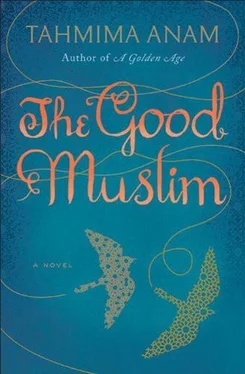And that is how it happened. A few weeks here, a few weeks there. Rangamati, Bandorbon, Kushtia. She finally travelled back up, avoiding the city, weaving up the Jamuna, the Brahmaputra, and into Rajshahi, where she settled, where she had her dreams of orphanhood, and where she found herself eating purple berries under a jackfruit tree, waiting for the postman.
Kakrail Mosque had none of the beauty of the mosques in the older parts of town. It was just a concrete structure, rectangular, with a minaret protruding upwards from its middle. Through the square-patterned grille, she could see men going about their business, kneeling down to pray, ducking under the taps to perform the Wazu, standing with their hands crossed in front of them, listening to a munajaat. So this was where Sohail spent all his time. Rising before dawn and making his way through the grey and sleeping city, to this place of fellow men.
She had woken Ammoo and told her she had to meet Sohail. Sohail, Ammoo said, sleep heavy in her mouth. You won’t find him. She had rushed out of the house, still wearing the grey cotton she’d had on since the night before, the birth fresh in her memory.
She entered through the gate and found a few men milling around outside the building. They looked at her, turned away, looked again. Stared, scratched behind their ears. She held back a smile. It’s all right, she wanted to say, I won’t bite you. Finally one approached her. ‘Women are not allowed,’ he said, clearing his throat.
‘I won’t stay long,’ she said, resisting the urge to stare him down. He couldn’t be more than fifteen or sixteen. Beard coming in spare and reluctant. His shoulders still narrow, frame still folded in on itself. He was about to say something to her, but an older man came up behind him and put an enormous hand on his shoulder.
‘Begum, I’m very sorry but we have no provisions for women. You must leave immediately.’ His voice was as big as his hand, deep and rough, as if scraped along the road.
‘I have business here,’ she said. ‘I’m looking for my brother.’
‘The Jumma prayer will begin soon. You must go.’
She was so tired. How hard could it be to find your own brother? ‘Sohail Haque — I’m looking for Sohail Haque.’
The man hesitated. His mouth opened and closed, a great, gaping hole surrounded by a pelt of beard. ‘He isn’t here.’
He was lying.
‘But this is where he comes, every day. Every day he is here.’
‘He is no longer with us.’ The man moved his arm, and she could tell he wanted to push her but he couldn’t, not in front of the others, standing around now and nudging each other, the crowd growing as people arrived for the Friday prayer.
‘No longer? Where is he?’
‘I don’t know,’ he said, giving her a look of undisguised impatience. The muezzin began the call to prayer. A megaphone sprang to life. Allah-hu Akbar Allaaaah hu Akbar.
The crowd around them began to line up for the prayer. The man cupped her elbow in his palm and led her to the gate. ‘Please — I must find my brother.’ She raised her voice. ‘Sohail, Sohail!’ But they were already at the gate, and with great force he hurled her elbow out on to the street and slammed the gate closed. ‘What are you all looking at?’ she heard him roar. ‘Get back to your prayers, go!’
He must be somewhere inside. She rubbed her elbow, and the night came back to her, Rokeya straining with her breech birth. Her confession. She considered the possibility of Rokeya’s being overcome by the pain of labour — but, in her experience, women were often at their most lucid at the moment of delivery. No, it had to be true. As soon as she had said it Maya knew it was true. The truth of it stopped the air in her throat. Zaid had lied about coming home on a holiday. She remembered Khadija’s words. We sent him back .
She heard someone behind her and turned around to see the young man she had first addressed. He leaned through a crack in the gate. ‘Your brother is at a mosque in Kolabagan. Take Elephant Road to Ghost Road. It’s a small place, next to an empty plot of land. A new building.’
‘A new mosque? But why?’ She wanted to reach through the gap, but he was already gone.
*
She followed the directions, Elephant Road to Ghost Road. She asked for the new mosque, waving down passers-by on the road. They pointed, directing her to smaller and smaller lanes. The people of this neighbourhood were intent on their tasks, the women dipping into buckets and coming up with pieces of washing, and the men carrying heavy things with agility, drums of water and boxed-up parcels and bags of cement. Even the telephone wires seemed to dangle over the pavements with lightness and grace.
When she saw the gate she knew it must be the one. Painted green, with a small star and crescent etched in white. She could smell the freshly laid cement, taste the white dust it imposed on the air around it. There was no bell to ring. She banged on the gate. No reply. She banged again. She turned the corner, looking for another entrance. A man walked past with a stack of bricks piled on his head. ‘Is this the new mosque?’ she asked him.
The man could not nod but called out: ‘You have to wait,’ he said. ‘They don’t open the gate.’
More waiting. She found a small cut in the high wall that surrounded the building and wedged herself into it, shielding her eyes against the sun with her hand. The Ghost Road residents drifted past. She thought about finding a telephone and ringing Joy. What would she say? He would drive up in his Honda and try to rescue her. She did not want to be rescued. The sun battered her arm, the lower part of her leg that was out of the shade. She dozed, waking blearily to catch the curious glances of people walking by.
The afternoon opened up, then fell away again, the streets quietening and slowing down, the shops shuttered or lit up for the evening, fluorescent bulbs and kerosene lamps and tiny open fires.
Sohail’s building did not stir. She hadn’t seen anyone go in or out. There was no call of the muezzin, no shuffle of bodies preparing for the prayer. Ammoo would have started to worry. She realised she hadn’t eaten all day, a throb in her stomach. She thought again that she should have waited for him to come home. Then the gate swung open and he was in front of her, his hands crossed over his chest.
‘How long have you been here?’
‘A long time. Can I come inside? I’m very thirsty.’
‘Wait.’ He dipped back through the gate and emerged with a tin mug of water.
The water was lukewarm, metallic. She drank it down. ‘So, this is your new place? What is it?’
‘A meeting house.’
‘Can anyone join?’
‘If they wish to, yes.’ He sighed heavily, then surprised her by putting his hand on her shoulder. ‘Is something troubling you, Maya?’
She decided to tread lightly. ‘That day, at the hospital,’ she said, ‘what did you whisper to Ammoo?’
‘Surah Yasin.’ His voice was tender, heavy with love. ‘Waalqurani alhakeemi, Innaka lamina almursaleena. .’ It must have been this that roused Ammoo, the call of her firstborn. The miracle of his voice.
‘She’s much better, you know. She’s walking around and everything.’
A rickshaw pulled up in front of them. ‘Jaben?’ asked the driver, ringing the bell.
Maya was about to wave him away, but Sohail said, ‘Wait over there. Apa will need to get home soon.’
‘Sohail, please, let me come inside. I need to speak with you.’
He said nothing, just stood in front of the door as if he were guarding what was inside. She realised she would have to tell him right there, on the street. ‘It’s about Zaid.’ She checked his face to see if he knew, if he had any idea. ‘I heard he ran away. When Ammoo was in the hospital.’
Читать дальше












